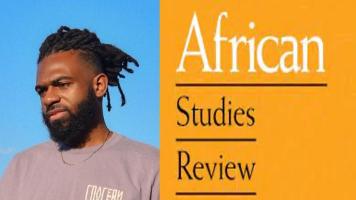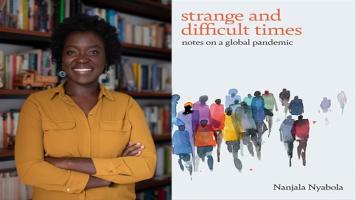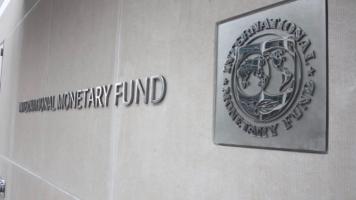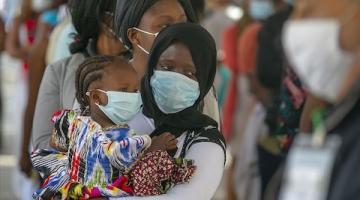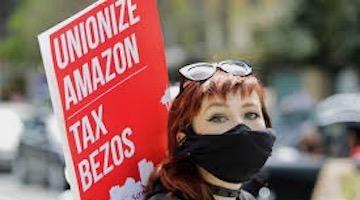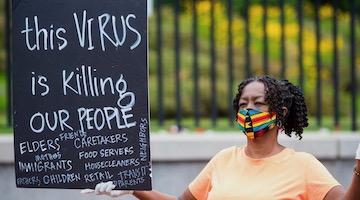African nations might have produced a patent free vaccine that would have benefitted the whole world. Instead they purchased patented vaccines which enriched pharmaceutical corporations outside of the continent.
This article is based on an interview conducted with Professor Christian Happi on August 30, 2021, as well as reports and articles hyperlinked in the piece.
A modest team leading the way quietly in Ede, Nigeria, at the little-discussed, African Centre for Excellence in Genomics and Infectious Diseases (ACEGID). This is how and where, by September 2020, a Covid-19 vaccine passed preclinical trials, with over 90% effectiveness against the first and second variants of the novel coronavirus in animals. Professor Christian Happi, director of the Centre explains: “Africa is endowed with a huge wealth of biodiversity. With it, using genomics, we can track infectious diseases as well as find solutions that can work for the world, like we have done for the novel coronavirus.”
The only glitch was that African governments would not provide the 250 million USD needed to run clinical trials. Not only a massive loss for Africa, the refusal to support the research is a loss for the globe’s majority. Happi argues that “because of the biodiversity in Africa, including plant, animal and human, if clinical trials had been successful, the vaccine would have been highly effective around the world.”
Added to this is the crucial fact that Happi and his team—unlike the Oxford scientists behind the AstraZeneca vaccine — would not have patented the vaccine. This would have made it accessible to impoverished and rich countries alike.
Instead of funding research and production of an African vaccine, African governments, through the African Union (AU), pooled resources to obtain financing of 2 billion USD - about four times more than what was needed for ACEGID clinical trials - to buy vaccines from multinational corporations (MNCs). The resources pooled, of course, are those of citizens of the continent, provided by the AU as collateral to the Africa Export-Import Bank (AFREXIMBANK). African states thus put Africans in yet deeper debt with some of the world’s richest banks and individuals — for profit-riddled COVID vaccines in short supply for the global majority.
AFREXIMBANK
Headquartered in Cairo, with offices in Abidjan, Harare, Abuja and Kampala, the AFREXIMBANK is a supranational financial institution established in 1993. Its investors are African governments, African central banks, African private banks, international private banks and financial institutions, and rich individuals. Listed on the Stock Exchange of Mauritius, AFREXIMBANK is a hallmark of neoliberal capitalism in Africa.
On the global scene, with an authorized share capital of 5 billion USD, AFREXIMBANK is a small player. Authorized share capital of Standard Bank (South Africa), for instance, was 19.3 billion back in 2004. Today’s top three billionaires in Africa, Aliko Dangote (Nigeria), Nassef Sawriris (Egypt), and Nicky Oppenheimer (South Africa), have a combined net worth of 28.6 billion USD. These three capitalists, in turn, fall far behind the richest billionaires and trillionaires of the world. Nevertheless, this short lesson in African finance debunks the myth that there is no money in Africa.
Largely reflecting the same global power structure, the quarter billion USD needed by ACEGID for clinical trials is a small fraction of the 10 billion USD invested by the US government in Operation Warp Speed, that funded COVID research of Moderna, Johnson & Johnson, Pfizer, and other MNCs.
Instead of investing in a not-for-profit COVID vaccine that would have served humanity as a whole, the AU, through its self-titled COVID-19 Vaccine Development and Access Strategy, has and continues to support clinical trials, roll-out, and uptake in Africa of for-profit vaccines produced by the same MNCs funded in Operation Warp Speed.
How to explain this choice made by African states?
Disarticulation
Far from being altogether new, the story of Africa’s COVID-19 vaccine is a recent iteration of ‘disarticulation’, elaborated by Samir Amin in his 1970 seminal work, L’accumulation à l’échelle mondiale (published in English as Accumulation on a World Scale in 1974).
Unlike the economies of colonizing, or so-called rich countries, different areas of production in the colony and post colony speak little to each other, if at all. Agricultural production is either cash crops for export or subsistence of the immediate producers (or a bit of both) — but rarely for mass consumption in another part of the same country. Raw materials are at best, partly processed, before being sent elsewhere to be turned into finished goods.
Manufactured goods, if produced within the post colony, consist mainly of imported inputs and technology. Industrialisation in the post colony therefore does not tend to mobilize various areas of production as it does in ‘rich’ countries.
For their part, elites in the colony/post colony — both national and multinational elites — re-invest very little in the post colony. This is not for a lack of profits generated in the post colony. Amin demonstrated this for Egypt. Between 1939 and 1953, though profits amounted to one third of national income in the colonial period, only 14 per cent of this was re-invested productively (mainly in family businesses, public shares and stocks in other companies). The rest was used for luxury consumption (38 per cent), to buy real estate (34 per cent), and liquid capital like gold (15 per cent).
This political-economic structure during colonial times set the tone for further capitalist development after Independence. Consumption of imported luxuries, real estate and liquid capital creates few jobs, hence the historic problem of high unemployment and underemployment in countries of the South — most of which have patterns resembling those of Egypt.
Full circle to Africa’s COVID-19 vaccine
In late May 2021, some 10 months after ACEGID’s numerous unheard proposals for investment in clinical trials, Cyril Ramaphosa, current head of the AU and president of South Africa, urged France’s President Macron to support manufacturing of MNC vaccines in African countries. Around the same time, at the start of what would be South Africa’s most deadly (third) wave of COVID-19, South African pharmaceutical firm, Aspen, was being suited-up by to Johnson & Johnson to produce the J & J COVID vaccine.
All of this complicates the story of ‘vaccine apartheid’ and the need for intellectual property waivers for COVID vaccines — a call trumpeted by African states and the majority of nongovernmental organisations alike. In different ways, both groups benefit from today’s iteration of the global poverty industry, in which, as Professor Happi puts it, “Africa behaves like an orphan that can do nothing but beg.”
Happi continues, “Africa is far from poor. We have powerful plant, animal and human biodiversity, as well as science and philosophy dating back centuries. We can put all this to productive use in new ways, combining with knowledge that Africans in the diaspora have gained from the world’s best universities.”
In February 2020, ACEGID sequenced the first genome of the SARS-Cov-2 circulating in Africa within 48 hours of receiving it. Happi and team tracked that the virus had entered via Europe and provided the information to the Africa Centre for Disease Control and Prevention, along with a containment strategy. African governments then instituted measures at airports and quarantine requirements. “Through this we were able to delay community transmission in Africa,” says Happi, “This is why COVID-19 has not hit the continent the way it has hit other continents.”
Throughout the pandemic, ACEGID and its partners have continued using advanced genomics tools and techniques and advising African governments on how to contain COVID-19. From June 14 to July 3, 2021, ACEGID conducted a first time training with epidemiologists of 14 African countries. Linking COVID containment strategies in the continent to ACEGID’s pioneering work on Ebola, Lassa and other viruses, Happi says “There is a quiet revolution in the making.”
Decommodifying healthcare
In its work and approach, ACEGID is planting seeds for the decommodication of healthcare in Africa. Decommodifying, or taking the profit motive out of healthcare, is the means to discovering and providing the specialised care needed by the majority — in pandemic as well as nonpandemic times — while training and employing people in the process.
The goal of decommodifying healthcare in Africa has the potential to draw back to the continent researchers and workers in the health sector that have left for studies and better jobs. Happi himself is an example. “If I wanted money I would have stayed at Harvard after my post-doctoral research. I returned to Africa to give back to this continent that has given me so much. As it has done in the long history of humanity, Africa can give to the world so very much.”
Salimah Valiani is author of Rethinking Unequal Exchange - The Global Integration of Nursing Labour Markets (University of Toronto Press, 2012) and author’s editor of The Future of Mining in South Africa (Mapungubwe Institute for Strategic Reflection, 2018). She has also published several policy, academic and popular articles in world historical political economy and feminist economics.

